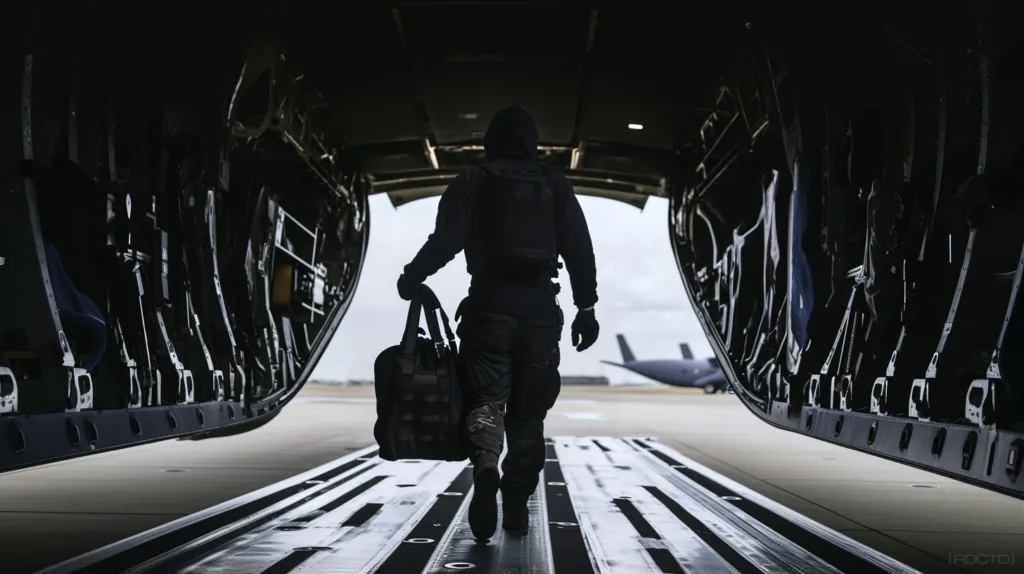Pursuing Your Life Goals Like They’re Covert Operations
The civilian’s tradecraft guide to perceiving, planning and achieving life goals the same way covert operations are.
Most people drift through life with vague ambitions, hoping they’ll work out. Operatives don’t think like that. Every mission has a strategy. If you treat your personal goals like covert ops, you’ll approach them with precision, patience, and proficiency – a mindset that drives successful missions.
Life goals and covert operations share some of the same DNA: both require clarity, foresight, and adaptability under pressure. An operative would never walk into hostile territory without a plan, and you shouldn’t step into the future without a structured path.
Missions succeed because objectives are broken into phases, risks are anticipated, and contingencies are in place. The same approach that turns personal ambitions into achievable outcomes. Whether it’s advancing your career, improving your health, or building a relationship, the process mirrors an operation. You gather intel, recruit allies, and execute with calculated action. The parallels remind us that achievement isn’t luck, it’s the result of disciplined tradecraft applied to everyday life.

I) Define the Mission Objective
Every successful operation starts with a clear objective. If the mission is vague, the execution will collapse under pressure. It’s the same with life goals. Without a defined target, you’ll drift, waste resources, and compromise the mission before it begins. Think of this stage as your mission briefing – it’s where intent becomes concrete, and you decide what the operation is really about.
• Translate Vision Into Target: A dream is broad, a mission is specific. “Be financially secure” turns into “Save $50,000 in the next three years.”
• Identify The End State: Picture the exact conditions of success. What does the environment look like once the mission is complete?
• Set Time Constraints: A mission without a timeline drags on until morale and discipline fade. Put deadlines on your objectives.
• Prioritize Objectives: Not every target can be hit at once. Rank them and decide which mission takes precedence.
• Test Mission Feasibility: Ask yourself, “Is this possible with the assets, intel, and time available?” Adjust scope before you move.
Clear objectives give you direction, but more importantly, they sharpen your mindset. When you define your mission with specificity, you create a compass that keeps you aligned even when the terrain shifts. Operatives know the difference between chasing shadows and hitting real targets – and your life goals demand the same discipline.

II) Gather Intelligence
No operative deploys without intel. Charging into a mission blind is recklessness, not bravery. In life, the same rule applies. If you don’t understand the terrain, the players, and the potential threats, you’re setting yourself up for failure. Gathering intelligence means doing your homework, building situational awareness, and stacking the odds in your favor before making a move.
• Map The Terrain: Study the environment you’ll be operating in. If your goal is career advancement, know the structure of your industry, the key decision-makers, and the hidden rules that govern promotions.
• Identify Assets and Liabilities: Take inventory of your current resources – skills, time, money, and connections. Just as important, identify your weaknesses and blind spots.
• Track Opposition and Obstacles: Every mission has resistance. In life, that may be financial constraints, lack of experience, or even your own bad habits. Anticipating them lets you plan countermeasures.
• Analyze Patterns of Success: Just like studying an adversary’s movements, learn from those who’ve achieved the objective before you. Their trail leaves clues.
• Establish Intelligence Channels: This could be mentors, research, training, or even subtle observation. The sharper your sources, the stronger your decisions.
Solid intelligence transforms uncertainty into calculated risk. You can’t eliminate every unknown, but you can reduce the margin of surprise. Operatives know intel is never wasted time – it’s the groundwork that makes execution precise, adaptable, and effective. The same applies to life: with the right intel, every move becomes intentional instead of accidental.

III) Build Your Cover Story
Every operative appreciates the value of a solid cover story. It’s more than disguises and backstopped elements – in this case it’s also creating an environment that shields the mission, keeps enemies guessing, and allows the operation to run smoothly. In life, your cover story is the framework of habits, routines, and surroundings that either support your goals or sabotage them. If your day-to-day environment contradicts your objectives, the mission will fail before it even starts.
• Shape The Environment: Create routines that align with the mission. If the goal is fitness, your “cover” might be reorganizing your kitchen, setting a strict workout schedule, and designing a daily rhythm that makes discipline automatic.
• Control Exposure: Not everyone needs to know your mission. Loose talk compromises operations. Share details only with trusted allies who support the objective.
• Blend in Strategically: Sometimes you can’t broadcast your goals without attracting unnecessary resistance. Move quietly, work in the shadows, and let results reveal themselves when the operation is complete.
• Reinforce with Small Details: Operatives know the smallest inconsistency can blow a cover. In life, this means cutting out habits, environments, and people that contradict your mission. Alignment at every level builds resilience.
• Protect Operational Security (OPSEC): Guard your mission from distractions and leaks. Social media oversharing, toxic influences, and energy-draining obligations are all threats to your cover.
A strong cover story makes your mission sustainable. It buys you time, protects your energy, and lets you focus on execution without interference. The best operatives blend seamlessly into their environment while advancing the objective in silence. In life, building your cover story ensures your goals are protected until it’s time to step out and claim victory.

IV) Establish Your Network
Very few successful missions are solo acts. Operatives rely on networks – handlers, assets, logistics officers, and allies in the field. In life, your network is the set of people and systems that support your objectives, whether directly or indirectly. That said, not every mission demands outside help. Some goals are better achieved under deep cover, where moving alone keeps things cleaner and more secure. The trick is knowing when to recruit support and when to operate independently.
• Recruit Mentors (senior operatives): Find people who’ve already walked the path you’re targeting. Their experience can shorten your learning curve and help you avoid costly mistakes.
• Build Field Alliances: Identify peers or colleagues who share the mission or can provide complementary skills. Mutual support increases resilience under pressure.
• Leverage Logistics: Support doesn’t always look like people cheering you on. It could be the right software, financial planning tools, or even routines that keep the mission supplied.
• Practice Asset Vetting: Not every ally is trustworthy. Vet carefully – look for reliability, discretion, and alignment with your objectives.
• Use Compartmentalization: Share information selectively. The best operatives don’t broadcast the whole plan. Give allies just enough to fulfill their role without risking operational security.
• Know When to go Dark: Some missions, especially those tied to personal transformation or sensitive ambitions, are best run alone. Independence prevents compromise and avoids external sabotage.
Your network can act as a force multiplier – the right people and systems can keep you supplied, focused, and protected while you move forward. But just like in covert operations, not every op calls for a team. Some targets require stealth and solitude. The key is discernment: deploy a network when it strengthens the mission, but never become dependent on it. The operative must be able to complete the objective whether backed by allies or operating alone.

V) Execute
This is where the rubber meets the road. Planning without disciplined execution is just fantasy. Operatives know that even the best intel and cover story fail without steady, methodical action. Execution with tradecraft discipline means turning plans into repeatable processes, moving with intent, and managing friction so you don’t waste momentum. It’s less about drama and more about consistency, the boring, daily work that actually wins missions.
• Create Standard Operating Procedures (SOPs): Break the mission into repeatable steps and write them down. SOPs reduce decision fatigue and keep you from improvising away progress.
• Time-Block Like a Field Schedule: Reserve dedicated, uninterrupted blocks for mission-critical work. Treat those slots as non-negotiable briefings – no socials, no side quests.
• Use Checklists and Pre-Mission Rituals: Before each work session, run a quick checklist (tools ready, goals set, distractions removed). Rituals prime your focus and signal your brain that it’s go-time.
• Attack in Small, Measurable Raids: Large goals collapse under their own size. Execute in short, aggressive sprints (daily or weekly objectives) that add up. Track metrics that matter – progress is motivating and diagnostic.
• Maintain Operational Security (OPSEC) on Your Energy: Protect focus like classified intel. Buffer time, set boundaries, and cut tasks that leak energy without return.
• Use Deception When Useful – Conceal to Conserve: Don’t confuse this with dishonesty; it’s about shielding your objective from naysayers and time-suckers so you can act without interference.
• Adapt Tactics, Not The Objective: If the terrain changes, switch your maneuvers, not your end state. Keep the mission goal stable while varying the approach.
• Practice The 80/20 of Effort: Identify the few actions that produce most results and prioritize them ruthlessly. Discipline is about doing the vital things repeatedly.
• Plan For Friction and Pre-Authorize Pivots: Expect setbacks. Pre-plan how you’ll respond so you don’t panic and waste time deciding under fire.
• Keep a Cadence of Short Debriefs: At the end of each day or sprint, log wins, failures, and lessons. Small debriefs keep the operation nimble and learning-focused.
Execution may not be glamorous, but it’s where tradecraft earns its keep. Discipline means having repeatable systems that turn intention into outcomes. Resilience for when things go sideways, and the patience to outlast distraction and doubt. Operatives don’t rely on bursts of motivation, they build rhythms that make success inevitable. Stay steady, run the SOPs, and the mission completes itself through consistent action..

VI) Debrief & Adapt
No mission ends the moment the target is reached. Operatives always run a debrief – the process of extracting lessons, analyzing mistakes, and identifying improvements for the next op. The same applies to your life goals. If you never stop to reflect, you’ll repeat the same errors, burn resources, and stall future progress. Debriefing gives you the intel you need to refine your tradecraft and strengthen your next phase.
• Conduct an After-Action Review (AAR): Ask the classic questions. What was the objective? What happened? Why did it happen? What can we sustain or improve?
• Document Lessons Learned: Keep a personal field log. Writing down insights solidifies them and creates a playbook you can refer to later.
• Celebrate Mission Wins: Don’t just pick apart mistakes. Acknowledge what worked. Reinforcing successful behaviors builds confidence and consistency.
• Identify Operational Weaknesses: Did you waste time? Did you underestimate resources? Were you derailed by outside interference? Naming flaws turns them into future countermeasures.
• Reallocate Resources: Maybe you discovered a skill gap or a lack of allies. Adjust your resource pool (training, tools, or support) before the next push.
• Update The Intel Picture: Missions change the terrain. Maybe new opportunities opened up, or the target shifted. Refresh your map before redeploying.
• Iterate, Don’t Reset: Avoid throwing the whole plan out because of setbacks. Keep what worked, adapt what didn’t, and move forward sharper.
Debriefing shouldn’t be seen as dwelling on mistakes, it’s to strengthen your operational playbook. An operative who skips the debrief keeps walking into the same ambushes. By analyzing outcomes and adapting your methods, every mission, successful or not, makes you more efficient, resilient, and lethal in pursuit of the next objective. Life’s missions don’t end, they evolve. The operative who adapts wins.

VII) Stay Mission-Ready
An operative doesn’t wait for the next mission to prepare because readiness is a constant state. Life goals demand the same mindset. Between operations, sharpen your skills, maintain your fitness, and keep your mental resilience intact.
• Stay Trained: Keep learning, upgrading skills, and running small drills to stay sharp.
• Maintain Fitness and Resilience: A strong body and clear mind keep you operational under stress.
• Update Intel Regularly: Conditions shift. Keep scanning the environment so you’re never caught off guard.
• Prep Your Next Objective: Always have a new mission on deck, even if it’s in early planning stages.
Mission readiness means you’re never idle, never complacent. You’re always prepared to act with speed and precision when the next target appears.
Treating your goals like covert operations shifts your mindset from “I hope” to “I will.” You become deliberate, strategic, and disciplined. Operatives don’t wait for perfect conditions – they prepare, execute, and adapt regardless of it. Apply the same tradecraft to your personal life, and you’ll start hitting objectives most people only dream about.
[OPTICS : Covert Operative Planning a Mission]
[INTEL : Plan ‘B’ Tradecraft Methodology]







